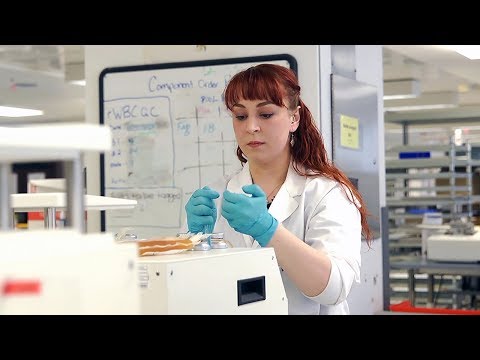Duties of a Medical Laboratory Assistant
Contents
- Duties of a medical laboratory assistant
- The Importance of a Medical Laboratory Assistant
- The Education and Training Required to Become a Medical Laboratory Assistant
- The Skills Needed to be a Medical Laboratory Assistant
- The Job Outlook for Medical Laboratory Assistants
- The Salary of a Medical Laboratory Assistant
- The Work Schedule of a Medical Laboratory Assistant
- The Working Conditions of a Medical Laboratory Assistant
- The Pros and Cons of Being a Medical Laboratory Assistant
- 10 Reasons Why You Should Become a Medical Laboratory Assistant
A medical laboratory assistant is a vital member of the healthcare team. They play a crucial role in ensuring that laboratory tests are accurately performed and that results are properly documented.
Their duties include preparing and organizing laboratory samples, operating and maintaining lab equipment, and performing basic lab tests. They may also be responsible for record-keeping and stocking supplies.
Checkout this video:
Duties of a medical laboratory assistant
Medical laboratory assistants (MLAs) are vital members of the healthcare team. They work in hospitals, clinics, and research laboratories under the supervision of medical laboratory technologists and other health professionals. MLAs perform a variety of tasks, including preparing and testing specimens, maintaining equipment, and keeping accurate records.
prepare specimens for analysis
test specimens using various techniques
maintain and calibrate equipment
keep accurate records of test results
Some MLAs also collect specimens from patients. In larger facilities, MLAs may specialize in a particular area, such as histology (the study of tissue), blood banking, or microbiology.
The Importance of a Medical Laboratory Assistant
Medical Laboratory Assistants (MLAs) play an important role in the healthcare system. They work in medical laboratories where they collect and process specimens, perform laboratory tests, and assist in the diagnosis of disease.
MLAs are an important part of the healthcare team. They work closely with other healthcare professionals, such as physicians, nurses, and pharmacists. Their work helps to ensure that patients receive the best possible care.
MLAs must be able to pay attention to detail, follow instructions carefully, and keep accurate records. They must also be able to work well under pressure and handle confidential information with discretion.
If you are interested in a career as a medical laboratory assistant, you will need to complete an accredited MLT program. After completing a training program, you will be eligible to take the National Certification Examination for Medical Laboratory Assistants (NCMA).
The Education and Training Required to Become a Medical Laboratory Assistant
In order to become a medical laboratory assistant, one must have at the very least a high school diploma. Although there are a number of ways to become a medical laboratory assistant, most will require some form of post-secondary education such as a certificate, diploma or degree from a community college, career college, university or other institute. The majority of programs related to this occupation are two years in length, although some may be completed in as little as one year.
Most pharmacy technician programs will include coursework in various aspects of the profession such as Medical Terminology anatomy and physiology, drug classifications and math. Many programs will also offer an internship component wherein students gain practical experience in a real life setting such as a hospital or retail pharmacy.
The Skills Needed to be a Medical Laboratory Assistant
In order to be a medical laboratory assistant, there are several skills that are required. These include:
– possession of a high school diploma or equivalent;
– being detail oriented and organized;
– good communication skills;
– being able to work independently;
– being able to work well under pressure;
– good manual dexterity;
– being able to follow instructions;
– being able to work well as part of a team.
The Job Outlook for Medical Laboratory Assistants
medical lab assistants (MLAs) work under the supervision of medical and clinical laboratory technologists to collect and process patient specimens for testing. They perform basic laboratory tests, prepare specimens for analysis and maintain lab equipment. Aspiring MLAs typically complete a postsecondary certificate program in medical laboratory assisting.
Most MLAs work in hospitals, diagnostic laboratories, blood donor centers or other healthcare facilities. According to the U.S. Bureau of Labor Statistics (BLS), employment of MLAs is projected to grow 16% from 2018 to 2028, much faster than the average for all occupations (www.bls.gov). The rising incidence of chronic conditions such as diabetes and cancer, along with an aging population, will result in an increased demand for diagnostic testing.
Job prospects should be best for those who have completed a formal training program in medical laboratory technology and are certified as medical laboratory technicians (MLTs) by a recognized accrediting organization, such as the National Accrediting Agency for Clinical Laboratory Sciences (NAACLS). In addition, MLS certification may be required by some employers.
The Salary of a Medical Laboratory Assistant
The average salary for a Medical Laboratory Assistant is $17.41 per hour in the United States Pay for Medical Laboratory Assistants varies widely depending on experience and location, with the highest salaries typically found in larger metropolitan areas. Many Medical Laboratory Assistants also receive benefits packages that can include health insurance paid vacation days, and 401(k) retirement plans.
The Work Schedule of a Medical Laboratory Assistant
The work schedule of a medical laboratory assistant may be full-time or part-time. It often depends on the needs of the employer. Many medical laboratory assistants work Monday to Friday during regular business hours. However, some positions may require evening or weekend shifts.
In general, medical laboratory assistants typically work in hospitals, diagnostic laboratories, and blood donor clinics. They may also work in research laboratories or pharmaceutical companies.
The Working Conditions of a Medical Laboratory Assistant
Most medical laboratory assistants work in hospitals or medical clinics. They may work in private laboratories, blood banks, or public health facilities. The work requires long periods of standing and some bending, stooping, and stretching. They must be able to lift and carry supplies and equipment, which may weigh as much as 50 pounds. Assistants may work with dangerous chemicals, so they must take precautions to avoid injury.
Medical laboratory assistants usually work a 40-hour week, but they may sometimes work evenings or weekends to cover for absent colleagues or to meet deadlines.
The Pros and Cons of Being a Medical Laboratory Assistant
The role of a medical laboratory assistant (MLA) is important in assisting pathologists and scientists in analyzing body fluids and tissue samples to help diagnose, treat, and prevent disease. MLAs may also be responsible for ensuring that the lab equipment is properly sterilized and maintained.
Working in a medical laboratory can be both challenging and rewarding. On the one hand, you will have the satisfaction of knowing that your work is directly helping to improve people’s health. On the other hand, you may sometimes be exposed to blood or other bodily fluids, and you will need to be comfortable working with potentially hazardous materials.
If you are considering a career as a medical laboratory assistant, it is important to weigh the pros and cons carefully before making a decision.
Pros:
-You will have the satisfaction of knowing that your work is directly helping to improve people’s health.
-You will be able to work in a variety of settings, including hospitals, clinics, private laboratories, and research facilities.
-You will have the opportunity to specialize in certain areas of medical laboratory work, such as histology or immunology.
-You may be able to advance to a position of greater responsibility over time, such as supervisor or manager.
Cons:
-You may sometimes be exposed to blood or other bodily fluids.
-You will need to be comfortable working with potentially hazardous materials.
-The work can be repetitious at times.
10 Reasons Why You Should Become a Medical Laboratory Assistant
A medical laboratory assistant (MLA) is an integral member of the healthcare team. MLAs perform a variety of tasks in the medical laboratory, including specimen collection, processing and testing. They also provide support to medical technologists, pathologists and other healthcare professionals.
Here are 10 reasons why you should become a medical laboratory assistant:
1. You can make a difference in the lives of others.
2. You will have the opportunity to work with cutting-edge technology.
3. You will be able to work in a variety of settings.
4. You will have the opportunity to work with a variety of people.
5. You will be able to learn new skills.
6. You will be able to use your existing skills in a new way.
7. You will be able to make a good income.
8. You will be able to have a flexible schedule.
9. You will be able to advance your career.
10







